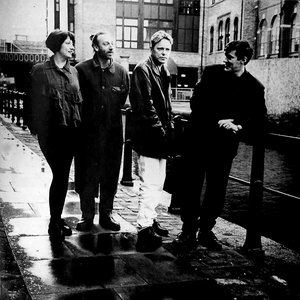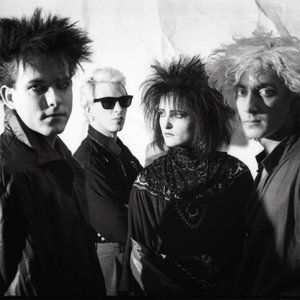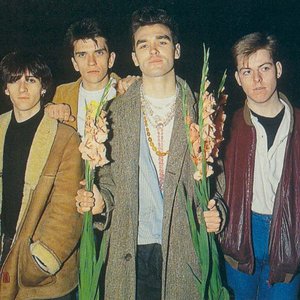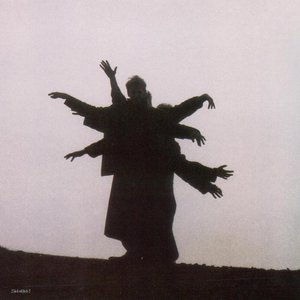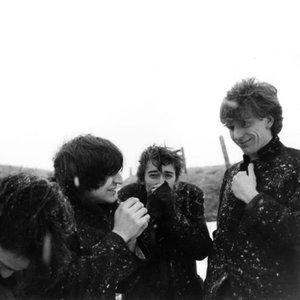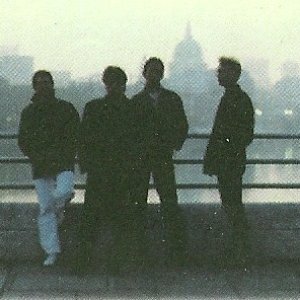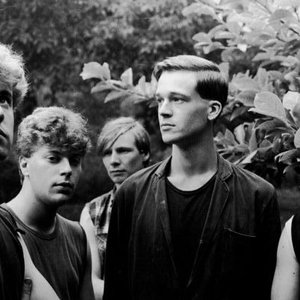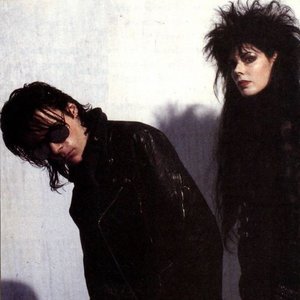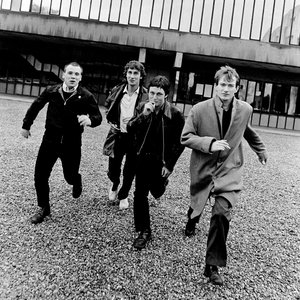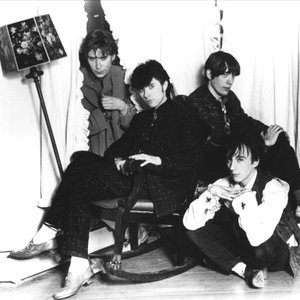Biography
-
Years Active
1978 – 1980 (2 years)
-
Founded In
Salford, Salford, Greater Manchester, England, United Kingdom
-
Members
- Bernard Sumner (1978 – 1980)
- Ian Curtis (1978 – 1980)
- Peter Hook (1978 – 1980)
- Stephen Morris (1978 – 1980)
Joy Division were a post-punk band formed in 1976 in Salford, Greater Manchester, United Kingdom. Originally named Warsaw, the band consisted of Ian Curtis (vocals and occasional guitar), Bernard Sumner (guitar and keyboards), Peter Hook (bass guitar and backing vocals) and Stephen Morris (drums and percussion). The band dissolved in May 1980 after the suicide of its lead singer, Ian Curtis. Much of their popularity/reputation arguably resulted from frequent playings on air by iconic DJ John Peel, but it is easy now to overlook the impact that the first album, Unknown Pleasures, had on post-punk music at the time, as reference the number of prominent bands that cited this album as an influence. The remaining members reformed as New Order and they have gone on to achieve much critical and commercial success.
With their dark, cavernous sound and their use of synthesizers and electronics, Joy Division are considered the pioneering band of the post-punk movement of the late 1970s and the early 1980s.
Though they found only modest success during their career, and released only two studio albums, Joy Division have since been acclaimed as one of the most inventive, evocative and influential groups of their era; Thom Jurek writes "They left just a small bit of music and an echo that still rings".
1976
Inspired by a Sex Pistols gig at the Manchester Lesser Free Trade Hall on July 20, 1976, Bernard Sumner (also credited as "Bernard Dicken" and "Bernard Albrecht") and Peter Hook formed a band with friend Terry Mason. Sumner bought a guitar, Hook purchased a bass, and Mason a drum kit. The band placed an advertisement in a Manchester record store and recruited Curtis as their singer. Curtis knew Sumner, Hook and Mason from previous gigs and was also in attendance at the Sex Pistols concert with his wife, Deborah. Richard Boon and Pete Shelley of Buzzcocks suggested the name "Stiff Kittens" for the band. Although "Stiff Kittens" appeared on some gig flyers, the band didn't like the name and never officially accepted it.
1977
Lacking confidence in his abilities as a drummer, Mason quit the group the day before their first gig to become their manager. He was replaced by Tony Tabac. Just before their first gig on May 29, 1977, supporting Buzzcocks and Penetration at the Electric Circus, the band renamed themselves Warsaw; though they had already appeared on the bill as the Stiff Kittens. Five weeks and half a dozen gigs later, Tabac was replaced by punk drummer Steve Brotherdale from another band called Panik. They recorded The Warsaw Demo on July 18, 1977, consisting of five crude punk songs.
After the demo, Brotherdale was fired. One member asked him to check on what he "thought" was a flat tyre. When he got out of the car, the other three drove off. Brotherdale tried to get Curtis to join Panik but was rebuffed. Stephen Morris who responded to an ad in a music store window, was hired as Brotherdale's replacement. He was hired primarily because Curtis remembered him from his academic days as Morris attended the same school two years below Curtis. Unlike the previous drummers, Morris clicked well with the three. His metronome-like drumming owed more to krautrock than the aggressive bombast typical of many punk drummers.
In late 1977, in order to avoid confusion with the London punk band Warsaw Pakt, Warsaw renamed themselves Joy Division. The name was in reference to groups of women used as sex slaves in Nazi German concentration camps depicted in Ka-Tzetnik 135633's 1955 novel The House of Dolls. Although the choice of name was more reflective of a desire to challenge taboos, this choice along with Sumner's adoption of the surname Albrecht garnered the band a lot of criticism for perceived insensitivity. They were even dogged by accusations of neo-Nazism, a charge they strenuously denied. The accusations resurfaced to a certain degree after Joy Division broke up and reformed as New Order, a name that could be interpreted as a reference to Hitler's speeches promising "the new order of the Third Reich." .
The band's music and style stabilized around this time. Sessions recorded in December 1977 sound considerably different from The Warsaw Demo.
1978
The group played their first gig as Joy Division on January 25, 1978. They played regularly in the north of England throughout early 1978, and then recorded enough material for a debut album. However, after the studio engineer added synthesizers to several tracks, the band scrapped it. The album would be released as a bootleg in 1982 and then officially 10 years later.
Rob Gretton became the band's manager in May 1978. Over the next 20 years, his addition would play an integral part in forming the Joy Division/New Order legacy.
Joy Division's debut on vinyl was on a compilation in the summer of 1978 called Short Circuit. Though listed as Joy Division, it was actually a track from the Warsaw days recorded live on October 2, 1977 The song, recorded live, was preceded by Sumner screaming "You all forgot Rudolf Hess". In June 1978 their December 1977 sessions were released as a 7" EP under the title An Ideal for Living. In late 1978, An Ideal for Living was remastered and re-released as a 12".
On September 20, 1978, they performed on the TV show Granada Reports; then in December 1978, they appeared on the compilation EP A Factory Sample, contributing two tracks recorded a few months earlier. This EP sold out within a couple of months and was the first release to document the haunting and atmospheric sound that Joy Division had been developing since that past summer.
Early 1979 saw Joy Division gain more publicity. Ian Curtis appeared on the front cover of the New Musical Express. Joy Division recorded a radio session in January (aired on BBC Radio 1 on February 14 by the respected DJ John Peel). On March 4, they supported The Cure at the Marquee Club, a major venue in London.
In April 1979, the band began recording their landmark debut album Unknown Pleasures at Strawberry Studios in Stockport, Greater Manchester. The record was far bleaker and darker than most of its contemporaries, featuring Hook's bass as the lead melodic instrument, drums soaked in icy reverb, Sumner's jagged guitar and Curtis's baritone vocal style. A large debt was owed to the genius of meticulous producer Martin Hannett. Whereas most punk rock bands had been extroverted and aggressive, Joy Division were more introverted and personal. Despite their insularity, however, their music could be very aggressive, chaotic and at times even violent.
The album cover, designed by Peter Saville based on a graph of 100 consecutive pulses from the pulsar CP 1919, is regarded as a classic of minimalist sleeve design. The image was found by Sumner in a book of Astronomy and represents "the final flashes of a dying star." Unknown Pleasures was released in June while Joy Division were recording five songs for Piccadilly Radio.
They performed on Granada TV again in July, made their first and last nationwide TV appearance in September on BBC2, supported The Buzzcocks in a 24-venue UK tour during October and November, and performed again on Peel's BBC radio show in December.
Despite the fact that Unknown Pleasures was selling well and receiving good reviews from the music press, all was not well. Curtis, who suffered from epilepsy, would often have onstage tonic-clonic seizures that resulted in unconsciousness and convulsions, or absence seizures that would cause brief trance-like pauses. Even after disposing of their light show, Curtis would still have these problems; and the band decided to rest over the Christmas holiday.
1980
In January 1980, Joy Division set out on a European tour. Several dates were cancelled due to Curtis's deteriorating health.
On February 28th, the band played a gig at the Warehouse in Preston. The gig was plagued with sound problems but was later released on Dynamic Records.
With Martin Hannett, again producing, the band began recording their second album Closer at the end of the European tour in March.
On April 8, the band played a gig at the Derby Hall in Bury. After jamming with support band Section 25, Joy Division's set began with Alan Hempstall of Crispy Ambulance and Simon Topping of A Certain Ratio filling in for Curtis who was initially too ill to perform. Curtis did manage to return, but only for a few songs. When the band resumed jamming without their singer, some members of the audience protested, turning the gig into a riot in which Hook, Gretton, and other crew members fought with angry onlookers.
Death of Curtis
Following a one-off gig in early May 1980, the band took a two weeks' rest before their first American tour was scheduled to start. At the time, Curtis's relationship with his wife, Deborah Curtis, was collapsing due to his infidelity with a Belgian woman, Annick Honoré, whom he had met on tour (no photograph of Honoré had ever been published until the 2006 book Torn Apart: The Life of Ian Curtis by Middles & Reade in which Annick gives her first public account of their relationship). Alone in his Macclesfield home, on May 18, 1980, Curtis reportedly watched Werner Herzog's Stroszek — about an artist who commits suicide — listened to Iggy Pop's debut solo album, The Idiot, and hanged himself. The following day, Curtis' body was discovered by his wife in their kitchen.
Aftermath
The band had long decided that if any one of them left or was unable to perform for any reason, they would end the band. In the summer of 1980, Love Will Tear Us Apart hit number 13 on the British singles chart, their biggest commercial success to date. In July 1980, Closer was finally released to overwhelmingly positive reviews; it also charted, peaking at number 6 on the British album chart. Sales of Unknown Pleasures were also robust.
At first glance Curtis' suicide appears to be exclusively the product of his own depression and ill health. Deborah Curtis' book Touching from a Distance gives the impression that Curtis always wanted to die young.
Despite Curtis' suicide, Joy Division essentially did not end in 1980, as the surviving members immediately toured and soon recorded new music. Eventually renaming themselves New Order and adding Morris' girlfriend Gillian Gilbert to cover keyboards and second guitar, the band was accordingly reborn. Alternating between guitar-drum-bass and electronic styles, the band's music reached and inspired a variety of listeners. New Order is often cited as one of the leading Synth Pop and dance music groups of their era, yet their use of traditional rock instruments such as guitars and live drums has reached a level of influence comparable with their landmark electronic works and they have become one of alternative rock's most beloved acts.
The band, and especially Ian Curtis, has been an inspiration for a number of musicians that include U2, The Smashing Pumpkins, Trent Reznor (who, as Nine Inch Nails, covered "Dead Souls" for the soundtrack of the movie The Crow), Robert Smith of The Cure and Red Hot Chili Peppers guitarist John Frusciante. The continuing importance of Joy Division was shown at the turn of the millennium when Peel asked his listeners to vote for the all-time Festive 50. At number one was the haunting Atmosphere, while Love Will Tear Us Apart sat at number three. Three more songs from the band sat on the list.
Much of the history of Joy Division was portrayed in the 2002 MGM/United Artists released film 24 Hour Party People which presented a somewhat fictionalised account of the rise and fall of the Factory Records, with whom both Joy Division and New Order were signed.
In 2007 the movie Control, directed by Anton Corbijn - depicting Curtis' life - was released. Curtis' bandmates Bernard Sumner, Peter Hook, and Stephen Morris provided incidental music for the soundtrack via New Order. The movie title comes from the Joy Division song "She's Lost Control".
Also in 2007, the documentary film simply titled Joy Division was released. Directed by Grant Gee, this movie is told by people who were there to experience Joy Division first-hand. The movie outlines the history of the legendary group and their first steps toward gigs and pre-recordings, but this is also the tale of a city - Manchester - which revitalises itself though the growing music scene of the time. The memories to the past are coloured by the suicide of singer Ian Curtis.
In 2005 Joy Division were accepted along with New Order into the UK Music Hall of Fame.
Artist descriptions on Last.fm are editable by everyone. Feel free to contribute!
All user-contributed text on this page is available under the Creative Commons Attribution-ShareAlike License; additional terms may apply.
